#eBook Formatting Companies
Explore tagged Tumblr posts
Text
Discover common eBook formatting mistakes and learn how to avoid them for a seamless reading experience. This guide provides insights into proper formatting techniques, ensuring your eBook looks professional and is easy to navigate. Avoid pitfalls like inconsistent fonts, poor alignment, and incorrect margins to enhance reader engagement. Gain the knowledge to create a polished and well-structured eBook. eBook formatting tips are crucial for authors and publishers aiming for high-quality digital publications.
#ebook formatting#ebook formatting services company#ebook formatting company#ebook formatting companies#eBook formatting services
0 notes
Text
Folks, if you've got ebooks from the 'Zon, please take note of this issue.
After February 26th, you can only download books from the Kindle store to your e-reader over Wi-Fi. ...[USB download to your computer is] a feature that a lot of Kindle users are probably not aware of, given books can be more easily sent to devices over Wi-Fi, but it’s especially useful for backing up purchases or converting them to other formats compatible with non-Kindle e-readers. ...It doesn’t happen frequently, but as Good e-Reader points out, Amazon has occasionally removed books from its online store and remotely deleted them from Kindles or edited titles and re-uploaded new copies to its e-readers. In 2009, the company removed copies of George Orwell’s Nineteen Eighty-Four and Animal Farm, explaining the books had been mistakenly published. More recently, many of Roald Dahl’s books, including Charlie and the Chocolate Factory, were replaced with updated copies featuring modified language on various ebook platforms. It’s a reminder that you don’t actually own much of the digital content you consume, and without the ability to back up copies of ebooks, you could lose them entirely if they’re banned and removed.
So, a word to the wise...
1K notes
·
View notes
Text
Review: “My Investing Journey and Learning” by Carmen Mundt
Qualifications: I’m a journalist reporting on business, economics, and defense who’s been in the industry for 7 years — the last 3 have been at, debatably, the #1 business publication in the world.
Rating: 2/5 stars
Thoughts: I cannot believe I spent 39 euros on this.
This 39 page ebook provides incredibly basic information that can all be found in this article.
First: while the ebook is about 40 pages, it probably has about 10 pages of actual information in it, interspersed with inspirational quotes from Sheryl Sandberg and Warren Buffet, with some pictures of Carmen in Monaco.
There’s about 1 page of “introduction” from Carmen that talks about her upbringing and journey to university in London. I won’t comment too much on her personal story, but an important thing to note is that she says she came from a “traditional Spanish household” where her father was the breadwinner and her mother had no access to family finances. After the 2008 crash, her family couldn’t afford to send her to college. She moved to London, applied for a student loan, and began studying finance at a university while working part time.
Carmen very, very briefly mentioned her regrets as to her mother’s inability to access higher education, work, and family financial planning; she says she’d never want to be in that position. While literally only one sentence, I think it makes it clear who the audience for this ebook is: someone who has absolutely, positively, no idea about money.
(She also very, very briefly mentions “big changes in her personal life” that made a full-time job in finance “not sustainable,” leading to her move to Monaco. This is her only reference to George.)
The rest of the book very simply explains how to make a budget, set financial goals, invest in the stock market, and mitigate risk. The information was kinda factually correct, and was written in a coherent manner. I think that’s the highest praise I can give it.
Here’s the thing: like other reviewers have called out, I am pretty certain that Carmen didn’t write anything besides the introduction. Whole sections (and indeed the entire format of the ebook) were clearly ripped from the Female Invest introductory courses. (I spent 3 hours clicking through each course so I could find direct wording comparisons to make this claim. I really wouldn’t recommend it.) I do think she edited these sections, and she interjected a few personal sentences; but I believe that’s where her involvement ended.
From an expert perspective, a lot of the information is so simplistic as to be almost incorrect. This isn’t a “first day of Econ 101” ebook — this is a “freshman year of high school home ec class” ebook. (Did anyone else’s home ec classes teach budgeting, or just me?)
Here’s an example. In a section on stocks, Carmen/Female Invest writes: “Investing in stocks allows you to support companies and causes you care about while still making a profit.”
On a basic level, this is correct. Purchasing a stock technically means you’re buying a little bit of a company, and I guess therefore supporting it. But unless a company is IPOing, you’re buying those stocks from another investor — which means your purchase has no effect on the company. So it’s a little disingenuous to claim you’re somehow helping the company. The ebook is rife with this kind of thing.
Carmen pushed in her advertising posts that the Female Invest courses were a key supplement to her book. So obviously, I had to do those too. And holy shit, they were so much worse than the ebook. Some parts were blatantly incorrect on basic information (they claim markets are open 24/7, when most are only open 9am-4:30pm on weekdays) and have some of the most patronizing metaphors I have ever read. (One of the most egregious was comparing your investment portfolio to a pizza because “stocks, bonds, and ETFs” make up different “sizes of slices to make a whole pie”. This isn’t even an accurate equivalent — maybe a calzone, pasta, and pizza make up a whole meal? I don’t even know.)
I would not recommend buying this ebook unless you, too, were barred from even thinking about a stock by your traditional father. Even then, consider free sources.
A Disclaimer on disclosures: So, after @ohblimeygeorge sent me a reddit post also reviewing Carmen’s book that mentioned ad disclosures, I decided to dive into the regulations. In the U.S., influential advertising is regulated by the FTC — in the EU, it’s regulated by the EU Commission, which I believe Carmen would qualify under since she is a Spanish citizen who lives in Monaco. First, I looked at this legal brief on content monetization business models, and concluded that that the ebook likely falls under “affiliate marketing” as Carmen likely receives a percentage of each ebook sold through her link.
(An additional disclaimer: obviously, I don’t know the details of the deal Carmen has with Female Invest, but I’d think it unlikely that she isn’t getting paid for their collaboration. She mentioned in an Instagram story under her Female Invest highlight that she “tried purchasing equity but they were already too big for what I could afford” but “did buy a bit of their crowdfunding.” Since she doesn’t have equity, i.e. doesn’t own a piece of the company, it’d be weird if she was doing this for free.)
Back on topic. I next looked at this legal brief on advertising disclosures. It states that affiliate marketing must be disclosed: “you need to make sure your audiences understand that it’s advertising.” Disclosures can include hashtags and “mentioning” advertising in the caption. Carmen has not disclosed advertising in any of her Female Invest posts, and appears to be violating this regulation. (Interestingly, her only posts that follow disclosure requirements are her Tommy posts.)
It’s apparently not uncommon. An EU Commission study showed 80% of influencers in the EU do not properly disclose ads.
So, there’s that too.
#I spent waaaaaay too long doing female invest courses for this#I was just horrified and couldn’t stop!!#my verdict#unfortunately#is that this IS the equivalent of a weight loss ebook peddled by an ig baddie#disappointing but I suppose unsurprising#happy to answer more questions if u message me!#george russell#carmen montero mundt#carmen mundt
166 notes
·
View notes
Link
Give Me Liberty! (7th Edition) - Seagull Edition - eBook eBook Details Authors: Eric Foner, Kathleen DuVal, Lisa McGirr File Size: 40 MB, 38 MB Format: PDF (converted), ePub (original) Length: 1344 Pages Publisher: W. W. Norton & Company; Seagull 7th edition Publication Date: December 7, 2022 Language: English ISBN-10: 132404120X, 1324041293 ISBN-13: 9781324041207, 9781324041290
210 notes
·
View notes
Note
So when I do finish this book I am writing (speaking it into existence bc adhd is a BITCH) Like what's your experience with publishing? How much does it usually cost? What kinda income does one get? I don't really care about making money but it would be super neat to make something since I cannot work. How do taxes work on that also? Google is confusing me
So far i have an idea and half a first chapter with thrilling notes such as " add a cat" and "insert spell here"
So I self publish, so that's the world I know. If you want to find a traditional publisher, you'll need to query agents and do a bunch of other stuff. My only advice for traditional publishing is that when going that route, money should always flow towards the author. If they're asking you to pay for something, they aren't a traditional publisher and there's a good chance it's a grift.
So let's talk about what I do know.
(And this turned out to be long as hell, so I'm putting in a "keep reading")
When you self publish, you are effectively acting as the publisher. If you want someone to do edits? You'll have to hire an editor. If you want someone to do the book layouts? You'll have to hire someone to do it if you can't do it yourself. You need a cover? You get the idea.
Now I don't pay an editor, so I can't really give you a price range on how much they cost off the top of my head. I do know they can get expensive though.
I also do all my own interiors, but I have a graphic design background and have been doing print layouts for decades. If you want to hire someone to do the interiors, that can run you $100-500, so I recommend just... learning to do it yourself.
Frankly, it's not terribly hard. I do mine in Apple Pages on my Mac for my paperbacks and Amazon has a free program for formatting eBooks (which you can export both as the Kindle format OR the more universal ePub format). With your print version, you just want to make sure you get your margins right, along with using a standard font like Times New Roman.
Like, literally just pick up a book and study the layout. Look at the front matter (copyright page, title page, etc) of a handful of books and mimic what you find there. I don't know why so many self published authors get that bit wrong. It's a book. Format it like a book.
Now the cover... this is where you'll probably end up spending something. I do my own covers for my comics, but hire out for my novels because I can't do the kind of covers expected of my genre. And you do want to match your genre, because you want a potential reader to know what they're getting into. I've seen so many self published books with terrible covers and it drives me nuts.
Cover design can run you anywhere from $35-$400 depending on who you choose to contract, and this is where I recommend you spend your money. On the cheap end you have companies like GetCovers. Now they primarily do covers made from edited stock photos, and I've honestly been pretty satisfied with their work... but you have to hold their hand and be very clear with what you want.
GetCovers is a part of Mibl Group, and it's pretty much all of their most inexperienced employees. The whole point of it is to get them the experience to work on bigger projects down the road. They have cheaper packages, but for their best work you'll probably only spend like $35-$45. If you're working in a genre that mainly uses stock images, that's who you want.
I often end up retouching the covers they do though, because I'm impatient. Like there are edits to The Witch and the Rose and Shadowcasting I made after they handed me the completed files. You're going to have to be very specific with what you want. The first version of the Bloody Damn Rite cover they did... was awful. But they did the revisions I asked for, and the version they delivered in the end was great.
Now if you want, like, original art or just more complicated, custom stuff? You're looking at at least $250 on the cheap end, but sometimes you end up in the ballpark of $700-$1000. Like on their regular site (just to use the same company as GetCovers for comparison), the Mibl group charges like $300 for a more complicated stock photo based cover (that requires more complicated edits) and at least $700 for covers that require digital painting, 3d modeling, etc.
There are a wide range of prices depending on what you're asking for. But, y'know, you're paying that once for a commercial piece of graphic design.
I'm cheap and can do some of the work myself, so I go for the $35 cover. I also figure out what fonts they used for the covers, so I can go buy my own commercial license for them and replicate a similar logo on my title page. You don't need to do that bit, I'm just finicky.
Actually publishing the book is easy. You'll want to use a self publishing platform like Kindle Direct Publishing or IngramSpark (or, if you're like me, both). I sell KDP books on Amazon, but all other distribution is through IngramSpark. You make more money on Amazon by using KDP, but even though they offer distribution, no book store will ever order through them. So I turn that option off, and then I take the same book and I make it available through IngramSpark.
On amazon I make a little more than $2 on a $3 ebook, and about $4.00 on a $12.99 paperback. When a bookstore buys an IngramSpark version, I make about $2.50 on a $14.99 book (if you wondered by my books cost more when not buying it through Amazon... that's why). Now if you buy yourself author copies, they cost way less -- in the end I think I can get them for like $5 a book? So when I sell them in person, my margins are much higher.
But, y'know, you have to actually sell them.
Because that's the hard part. When self publishing, you only have you to market it. I don't know how many books I'd be selling if I didn't have a pre-existing audience -- and even then it's not a huge amount. I've sold about 200 books this year? Which isn't nothing, and I appreciate every single person who's purchased one of my titles, but it's obviously not enough to quit my day job for, y'know?
That said, I've known people who do sell enough to make a steady living. So it's possible for sure.
But it's not going to happen overnight, and it won't be easy.
As for taxes, you'll need a 1099 and do stuff with the Schedule C. I always forget exactly what until I'm actually doing them, but it's not super hard, just annoying.
69 notes
·
View notes
Text
Solar is a market for (financial) lemons

There are only four more days left in my Kickstarter for the audiobook of The Bezzle, the sequel to Red Team Blues, narrated by @wilwheaton! You can pre-order the audiobook and ebook, DRM free, as well as the hardcover, signed or unsigned. There's also bundles with Red Team Blues in ebook, audio or paperback.

Rooftop solar is the future, but it's also a scam. It didn't have to be, but America decided that the best way to roll out distributed, resilient, clean and renewable energy was to let Wall Street run the show. They turned it into a scam, and now it's in terrible trouble. which means we are in terrible trouble.
There's a (superficial) good case for turning markets loose on the problem of financing the rollout of an entirely new kind of energy provision across a large and heterogeneous nation. As capitalism's champions (and apologists) have observed since the days of Adam Smith and David Ricardo, markets harness together the work of thousands or even millions of strangers in pursuit of a common goal, without all those people having to agree on a single approach or plan of action. Merely dangle the incentive of profit before the market's teeming participants and they will align themselves towards it, like iron filings all snapping into formation towards a magnet.
But markets have a problem: they are prone to "reward hacking." This is a term from AI research: tell your AI that you want it to do something, and it will find the fastest and most efficient way of doing it, even if that method is one that actually destroys the reason you were pursuing the goal in the first place.
https://learn.microsoft.com/en-us/security/engineering/failure-modes-in-machine-learning
For example: if you use an AI to come up with a Roomba that doesn't bang into furniture, you might tell that Roomba to avoid collisions. However, the Roomba is only designed to register collisions with its front-facing sensor. Turn the Roomba loose and it will quickly hit on the tactic of racing around the room in reverse, banging into all your furniture repeatedly, while never registering a single collision:
https://www.schneier.com/blog/archives/2021/04/when-ais-start-hacking.html
This is sometimes called the "alignment problem." High-speed, probabilistic systems that can't be fully predicted in advance can very quickly run off the rails. It's an idea that pre-dates AI, of course – think of the Sorcerer's Apprentice. But AI produces these perverse outcomes at scale…and so does capitalism.
Many sf writers have observed the odd phenomenon of corporate AI executives spinning bad sci-fi scenarios about their AIs inadvertently destroying the human race by spinning off in some kind of paperclip-maximizing reward-hack that reduces the whole planet to grey goo in order to make more paperclips. This idea is very implausible (to say the least), but the fact that so many corporate leaders are obsessed with autonomous systems reward-hacking their way into catastrophe tells us something about corporate executives, even if it has no predictive value for understanding the future of technology.
Both Ted Chiang and Charlie Stross have theorized that the source of these anxieties isn't AI – it's corporations. Corporations are these equilibrium-seeking complex machines that can't be programmed, only prompted. CEOs know that they don't actually run their companies, and it haunts them, because while they can decompose a company into all its constituent elements – capital, labor, procedures – they can't get this model-train set to go around the loop:
https://pluralistic.net/2023/03/09/autocomplete-worshippers/#the-real-ai-was-the-corporations-that-we-fought-along-the-way
Stross calls corporations "Slow AI," a pernicious artificial life-form that acts like a pedantic genie, always on the hunt for ways to destroy you while still strictly following your directions. Markets are an extremely reliable way to find the most awful alignment problems – but by the time they've surfaced them, they've also destroyed the thing you were hoping to improve with your market mechanism.
Which brings me back to solar, as practiced in America. In a long Time feature, Alana Semuels describes the waves of bankruptcies, revealed frauds, and even confiscation of homeowners' houses arising from a decade of financialized solar:
https://time.com/6565415/rooftop-solar-industry-collapse/
The problem starts with a pretty common finance puzzle: solar pays off big over its lifespan, saving the homeowner money and insulating them from price-shocks, emergency power outages, and other horrors. But solar requires a large upfront investment, which many homeowners can't afford to make. To resolve this, the finance industry extends credit to homeowners (lets them borrow money) and gets paid back out of the savings the homeowner realizes over the years to come.
But of course, this requires a lot of capital, and homeowners still might not see the wisdom of paying even some of the price of solar and taking on debt for a benefit they won't even realize until the whole debt is paid off. So the government moved in to tinker with the markets, injecting prompts into the slow AIs to see if it could coax the system into producing a faster solar rollout – say, one that didn't have to rely on waves of deadly power-outages during storms, heatwaves, fires, etc, to convince homeowners to get on board because they'd have experienced the pain of sitting through those disasters in the dark.
The government created subsidies – tax credits, direct cash, and mixes thereof – in the expectation that Wall Street would see all these credits and subsidies that everyday people were entitled to and go on the hunt for them. And they did! Armies of fast-talking sales-reps fanned out across America, ringing dooorbells and sticking fliers in mailboxes, and lying like hell about how your new solar roof was gonna work out for you.
These hustlers tricked old and vulnerable people into signing up for arrangements that saw them saddled with ballooning debt payments (after a honeymoon period at a super-low teaser rate), backstopped by liens on their houses, which meant that missing a payment could mean losing your home. They underprovisioned the solar that they installed, leaving homeowners with sky-high electrical bills on top of those debt payments.
If this sounds familiar, it's because it shares a lot of DNA with the subprime housing bubble, where fast-talking salesmen conned vulnerable people into taking out predatory mortgages with sky-high rates that kicked in after a honeymoon period, promising buyers that the rising value of housing would offset any losses from that high rate.
These fraudsters knew they were acquiring toxic assets, but it didn't matter, because they were bundling up those assets into "collateralized debt obligations" – exotic black-box "derivatives" that could be sold onto pension funds, retail investors, and other suckers.
This is likewise true of solar, where the tax-credits, subsidies and other income streams that these new solar installations offgassed were captured and turned into bonds that were sold into the financial markets, producing an insatiable demand for more rooftop solar installations, and that meant lots more fraud.
Which brings us to today, where homeowners across America are waking up to discover that their power bills have gone up thanks to their solar arrays, even as the giant, financialized solar firms that supplied them are teetering on the edge of bankruptcy, thanks to waves of defaults. Meanwhile, all those bonds that were created from solar installations are ticking timebombs, sitting on institutions' balance-sheets, waiting to go blooie once the defaults cross some unpredictable threshold.
Markets are very efficient at mobilizing capital for growth opportunities. America has a lot of rooftop solar. But 70% of that solar isn't owned by the homeowner – it's owned by a solar company, which is to say, "a finance company that happens to sell solar":
https://www.utilitydive.com/news/solarcity-maintains-34-residential-solar-market-share-in-1h-2015/406552/
And markets are very efficient at reward hacking. The point of any market is to multiply capital. If the only way to multiply the capital is through building solar, then you get solar. But the finance sector specializes in making the capital multiply as much as possible while doing as little as possible on the solar front. Huge chunks of those federal subsidies were gobbled up by junk-fees and other financial tricks – sometimes more than 100%.
The solar companies would be in even worse trouble, but they also tricked all their victims into signing binding arbitration waivers that deny them the power to sue and force them to have their grievances heard by fake judges who are paid by the solar companies to decide whether the solar companies have done anything wrong. You will not be surprised to learn that the arbitrators are reluctant to find against their paymasters.
I had a sense that all this was going on even before I read Semuels' excellent article. We bought a solar installation from Treeium, a highly rated, giant Southern California solar installer. We got an incredibly hard sell from them to get our solar "for free" – that is, through these financial arrangements – but I'd just sold a book and I had cash on hand and I was adamant that we were just going to pay upfront. As soon as that was clear, Treeium's ardor palpably cooled. We ended up with a grossly defective, unsafe and underpowered solar installation that has cost more than $10,000 to bring into a functional state (using another vendor). I briefly considered suing Treeium (I had insisted on striking the binding arbitration waiver from the contract) but in the end, I decided life was too short.
The thing is, solar is amazing. We love running our house on sunshine. But markets have proven – again and again – to be an unreliable and even dangerous way to improve Americans' homes and make them more resilient. After all, Americans' homes are the largest asset they are apt to own, which makes them irresistible targets for scammers:
https://pluralistic.net/2021/06/06/the-rents-too-damned-high/
That's why the subprime scammers targets Americans' homes in the 2000s, and it's why the house-stealing fraudsters who blanket the country in "We Buy Ugly Homes" are targeting them now. Same reason Willie Sutton robbed banks: "That's where the money is":
https://pluralistic.net/2023/05/11/ugly-houses-ugly-truth/
America can and should electrify and solarize. There are serious logistical challenges related to sourcing the underlying materials and deploying the labor, but those challenges are grossly overrated by people who assume the only way we can approach them is though markets, those monkey's paw curses that always find a way to snatch profitable defeat from the jaws of useful victory.
To get a sense of how the engineering challenges of electrification could be met, read McArthur fellow Saul Griffith's excellent popular engineering text Electrify:
https://pluralistic.net/2021/12/09/practical-visionary/#popular-engineering
And to really understand the transformative power of solar, don't miss Deb Chachra's How Infrastructure Works, where you'll learn that we could give every person on Earth the energy budget of a Canadian (like an American, but colder) by capturing just 0.4% of the solar rays that reach Earth's surface:
https://pluralistic.net/2023/10/17/care-work/#charismatic-megaprojects
But we won't get there with markets. All markets will do is create incentives to cheat. Think of the market for "carbon offsets," which were supposed to substitute markets for direct regulation, and which produced a fraud-riddled market for lemons that sells indulgences to our worst polluters, who go on destroying our planet and our future:
https://pluralistic.net/2021/04/14/for-sale-green-indulgences/#killer-analogy
We can address the climate emergency, but not by prompting the slow AI and hoping it doesn't figure out a way to reward-hack its way to giant profits while doing nothing. Founder and chairman of Goodleap, Hayes Barnard, is one of the 400 richest people in the world – a fortune built on scammers who tricked old people into signing away their homes for nonfunctional solar):
https://www.forbes.com/profile/hayes-barnard/?sh=40d596362b28
If governments are willing to spend billions incentivizing rooftop solar, they can simply spend billions installing rooftop solar – no Slow AI required.

Berliners: Otherland has added a second date (Jan 28 - TOMORROW!) for my book-talk after the first one sold out - book now!

If you'd like an essay-formatted version of this post to read or share, here's a link to it on pluralistic.net, my surveillance-free, ad-free, tracker-free blog:
https://pluralistic.net/2024/01/27/here-comes-the-sun-king/#sign-here

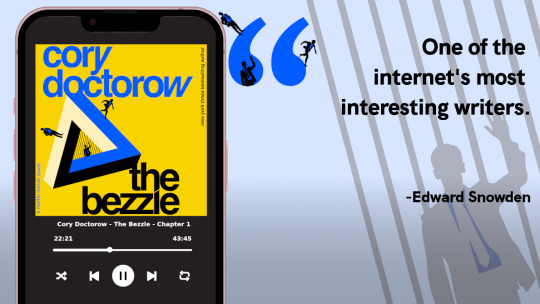
Back the Kickstarter for the audiobook of The Bezzle here!

Image:
Future Atlas/www.futureatlas.com/blog (modified)
https://www.flickr.com/photos/87913776@N00/3996366952
--
CC BY 2.0
https://creativecommons.org/licenses/by/2.0/
J Doll (modified)
https://commons.wikimedia.org/wiki/File:Blue_Sky_%28140451293%29.jpeg
CC BY 3.0
https://creativecommons.org/licenses/by/3.0/deed.en
#pluralistic#solar#financialization#energy#climate#electrification#climate emergency#bezzles#ai#reward hacking#alignment problem#carbon offsets#slow ai#subprime
232 notes
·
View notes
Text




Malediction: A Vashwood Gods AU
In the dark depths of a living cage A celestial creature is locked tight in a curse Tucked away from the living and the dead In the hell of a god’s creation With only its own thoughts for company Escape is a dream A wish But When a god prays Who answers?
I'm finally wrapping some of my Trigun poetry up into shiny ebooks! I was going to wait to space these out throughout the month as my dreaded birthday approaches, but alas! Vet bills.
Here this one is on Ko-fi! It's the same completed fic that's also on AO3 but in a prettier ebook form with a cover—basically a tip jar. All proceeds will go to my expensive furry children!!!
I can also format other work if anyone's interested!
#Trigun#Vashwood#Poetry#Fanpoetry#Fanpoem#Very proud of what Molten and I created with this one <3#I could NOT have made anything this cool without him!!!!
15 notes
·
View notes
Text
publishing companies are keeping us from the ideal digital book format the combined ebook audiobook where its a regular ebook you can look at pictures and graphs skip about with the index search it change font size etc but if u click anywhere in it you can choose to start up the audiobook wherever and the pages will scroll with the speed adjustable audiobook and u would experience peace and love on planet earth but libby and amazon do not wish us to be able to live like this
12 notes
·
View notes
Note
Hey so question I went to the company of shadows website to download the book and I’m confused on which one is the original (sorry this is a stupid question lol) is it the one I circled in blue? I just want to make sure

HELLO I'm so happy you decided to jump in! Mind the trigger warnings for pretty much everything you can think of (HERE for a more extensive list), but the story somehow manages to end on a "happy ending" note (or the dystopian version of it), so hold onto hope when things get dire.
Now, for how and what you can read:
[I'm going to repeat things you might already know or are not interested in, but bear with me for the sake of possible new readers] The first links that you see are for the DC (director's cut) of the first book. In the DC the first book is split into two volumes. Should you start with that? Honestly, I'm an old school reader and I would suggest you to postpone the DC for a second reread. The first main issue is that it's 100k shorter (and while it improves many passages, it also cuts down others that many of us readers think were important), but you won't get that courtesy from book 2 onward. So you risk getting used to the DC, which is closer to the standard novel length and style you find in the industry, and then you get slapped with book 2 and 3 and 4 which are sensibly longer and different.
The writing style is also another thing you risk noticing the change of if you start with the DC. ICoS was originally a RP then turned novel, and it shows (I say it with the utmost affection). The DC masks this a little.
So, I would personally tell you to ignore the DC, but it's really up to you. If you decide to go with that, that will be your door to Evenfall, which is book 1.
The epub/mobi/pdf links you circled are Evenfall downloadable in those formats. You can choose that if you want the comfort or reading the book on whatever reader you're using. (Ais' website has also an entire Ebook links section that has everything you might want, including a single zip file containing all books in all formats)
What you pointed with the arrow is where my heart is. I see that long-ass list of chapters with dates (from book 2 and on) and I am back sitting on the couch of my little uni apartment in Venice, forgetting what hour is and when's the last time I ate. That's literally the books, in the order and fashion they were originally posted chapter by chapter online. The only difference with the epub/mobi/pdf you circled is the reader/user experience you get from reading right on the website, eyeing that "Uploaded on" at the start of the page, clicking on "Continue to" at the end to switch to the next chapter or book. Idk, it's decadent to me.
Please keep in mind that on the original website you won't get the epub/mobi/pdf versions of book 2-3-4. You need to hop on Ais' website (which I linked above) to do that. And don't forget the Side Stories you can find on the original website (the one you screenshotted).
If you have other questions, I'm here. And absolutely totally feel free to send me reactions and comments as you read, or put them in the tag <3
6 notes
·
View notes
Text
So, there’s an ebook entitled ‘Farquhar’ (you can read it for free with an NLB account via the Libby app). Before I had read the book, I have searched YouTube to see if anyone had made a Raffles vs Farquhar rap battle before, but was disappointed that nobody has made anything yet. However, after reading the book, I realised that the book was pretty much a rap battle in book format, although it calls itself a poem.
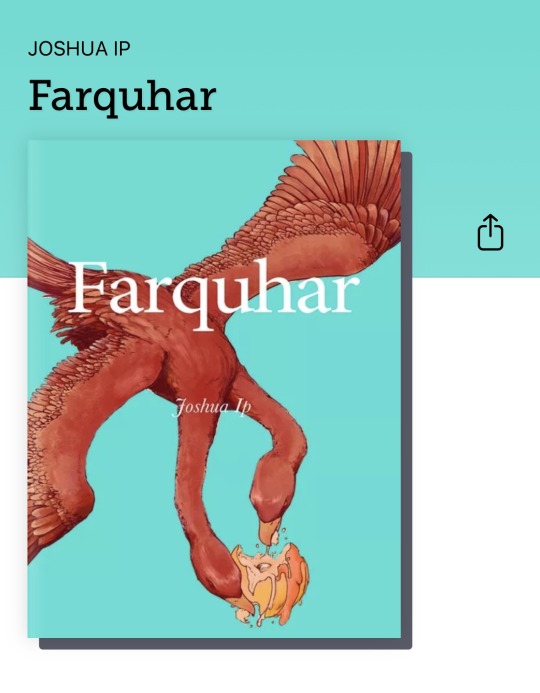
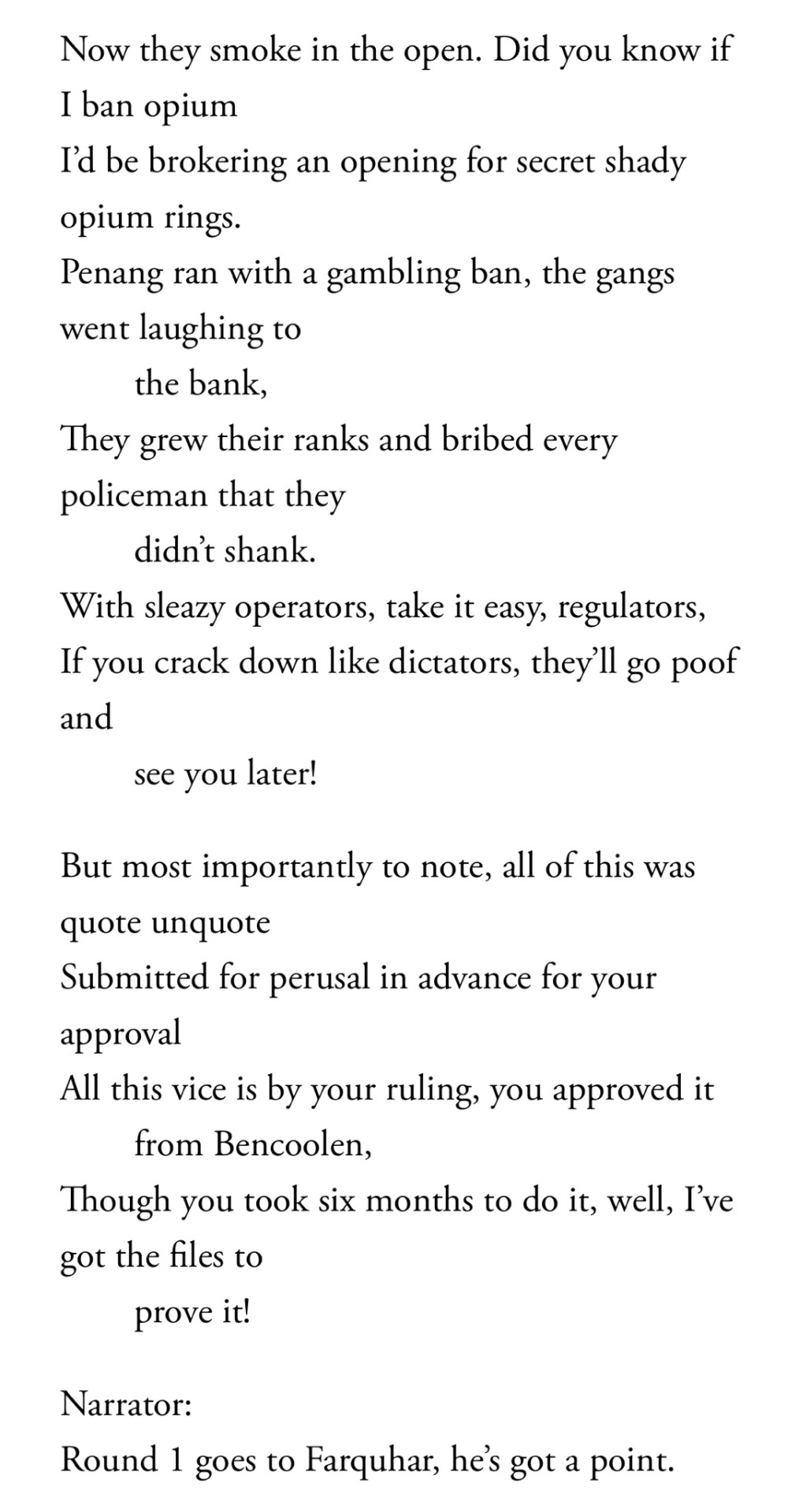
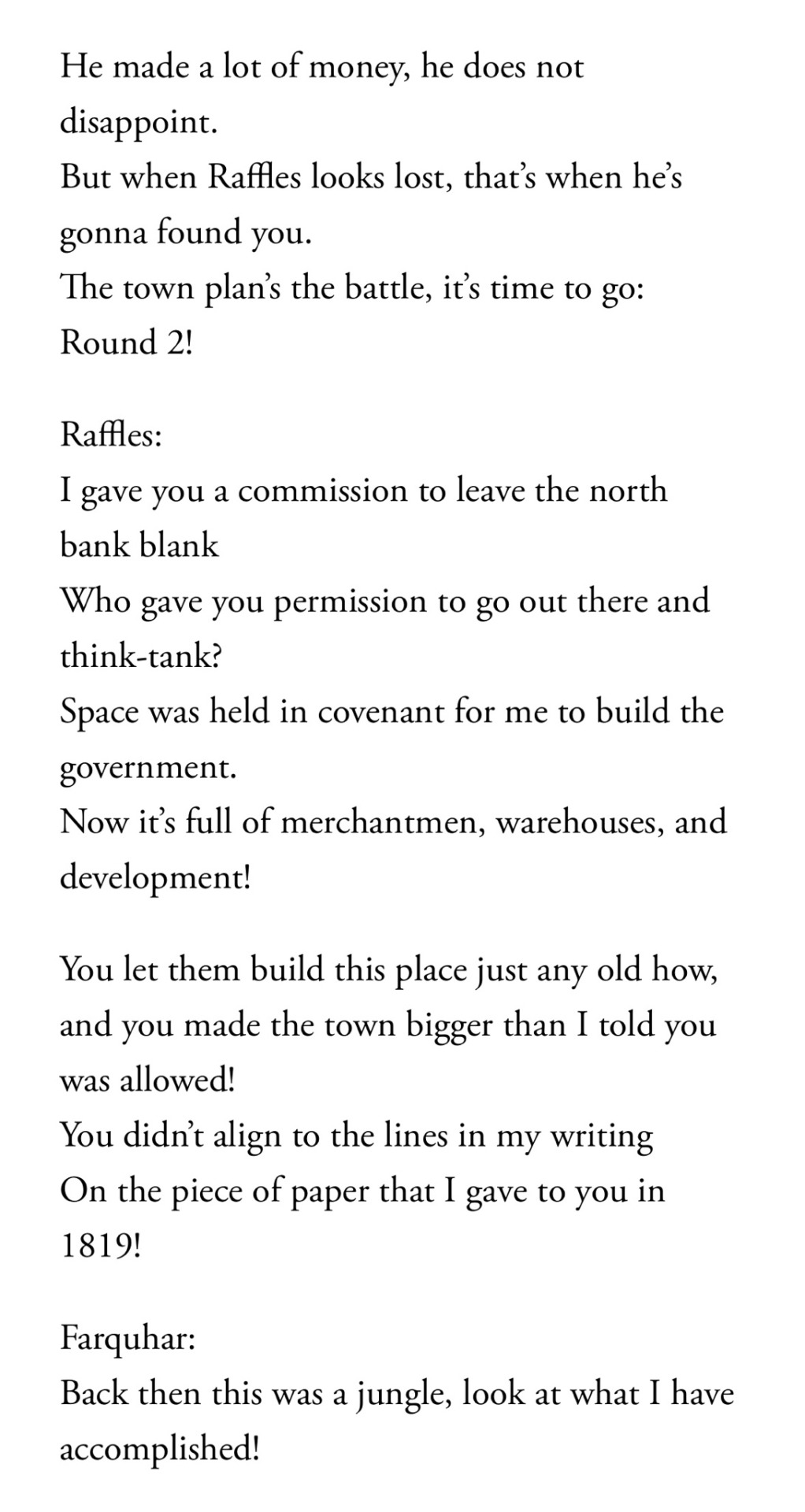
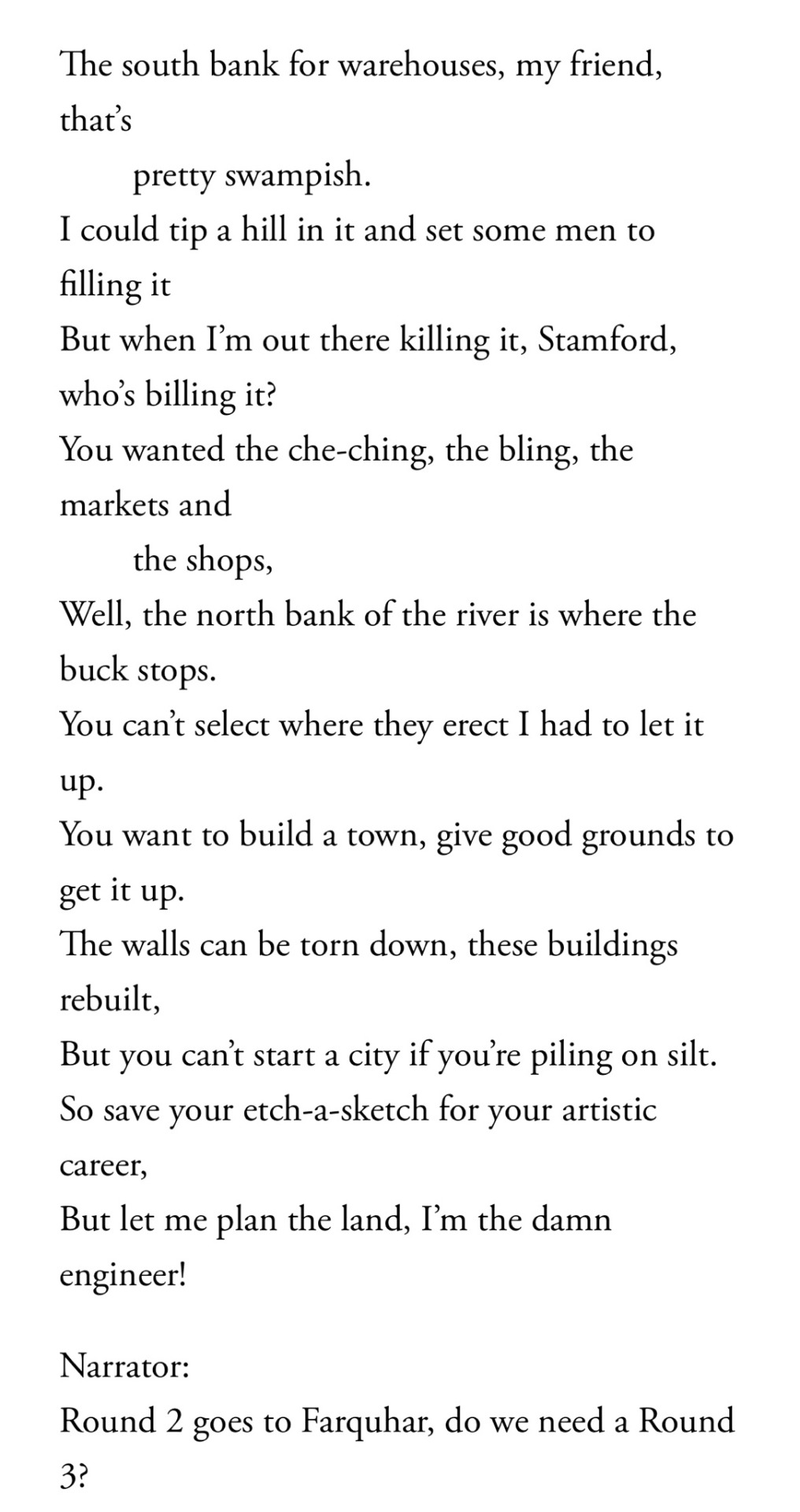
The book even has Nonio and Sophia join in mid-way, like a typical Epic Rap Battles of History rap 🤣. By the way, shouldn’t Sophia be calling Raffles ‘Thomas’?
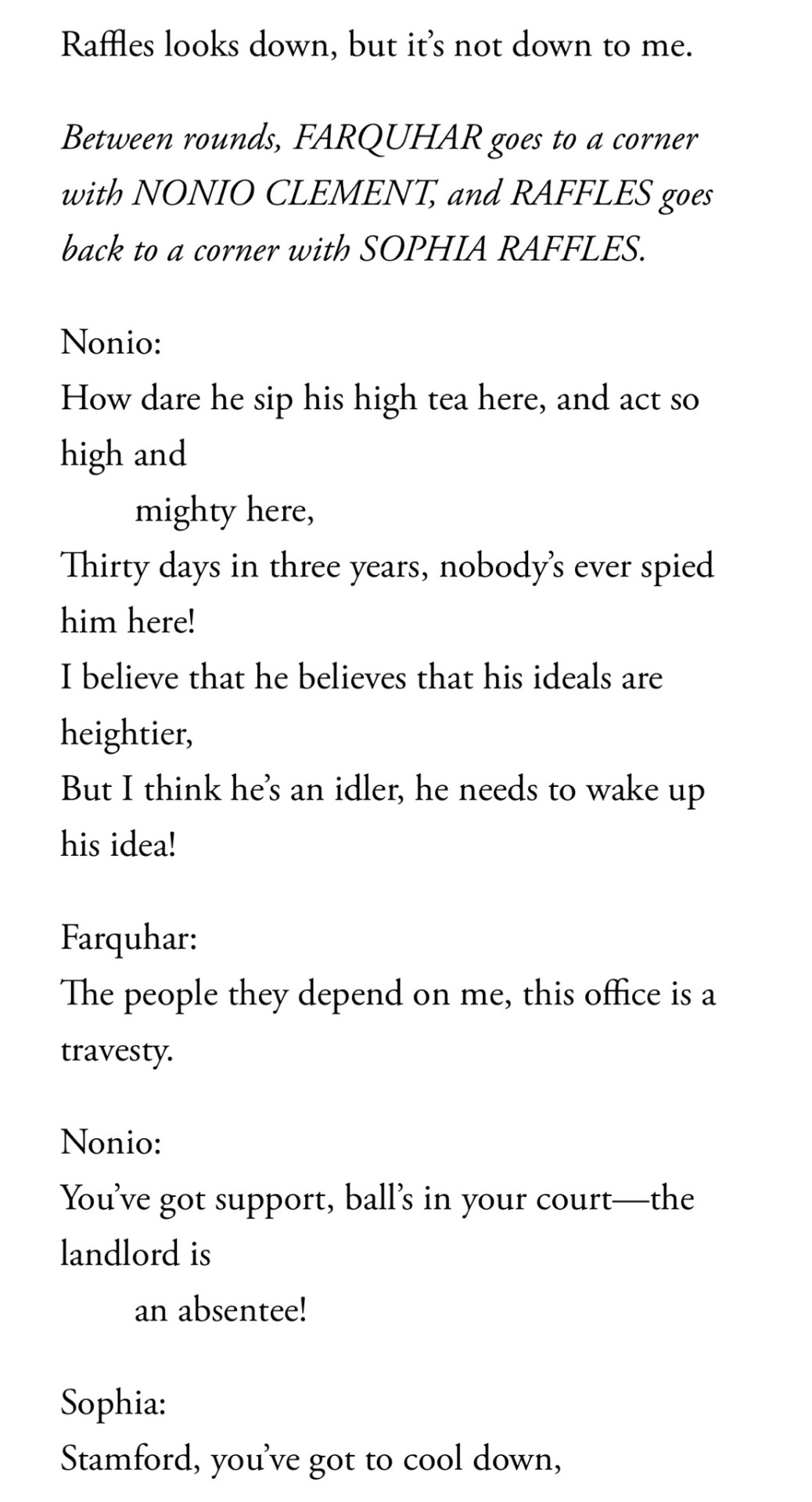
I asked ChatGPT to write me an Epic Rap Battle of History-style rap between Raffles and Farquhar, and here was what I got:
EPIC RAP BATTLES OF HISTORY!
SIR STAMFORD RAFFLES! VS. WILLIAM FARQUHAR! BEGIN!
RAFFLES:
I’m the legend, the visionary, the man with the plan, Put Singapore on the map, made it known to every land! Drew the lines, set the laws, built a city so grand, While you sat back, letting chaos expand!
You let the crooks run wild, let the vices take root, I brought in the order, made the traders salute! You claim you built this? Please, don’t be absurd, You were just the caretaker—I gave the word!
I wrote the letters that shaped this place, While you let smuggling run the race! Took you months to write, took me days to erase, Then I sealed your fate with Hastings’ grace!
FARQUHAR:
You gave the word? Well, I did the deed! While you were gone, I made sure the people could feed! Cleared the swamps, built the town, kept the peace, While you played governor from afar—oh, please!
You made the plans, but I made them work, While you sat dreaming, I was down in the dirt! Talk all you want, but let’s set it straight, Without me, this island would’ve met a worse fate!
And you wanna talk letters? Man, what a joke! Months for a reply—was your pen filled with smoke? I begged for guidance, but what did you do? Left me hanging, then blamed me too!
And don’t act like you had my back, You slandered my name with a coward’s attack! Told Hastings lies, got me dismissed, Then left me with nothing—man, you don’t miss!
(Sophia Raffles steps in.)
SOPHIA RAFFLES:
Enough, Farquhar, your story’s old, You let this place turn to filth uncontrolled! My husband had vision, he saw what was right, You let vice and crime run into the night!
Raffles made history, his name will remain, You? A footnote, lost in the rain. Singapore stands because of his might, You played a part, but he won the fight!
And don’t get me started on credit and fame, I made sure the world knew his name!
(Nonio Clement steps in.)
NONIO CLEMENT:
Oh, come on, Sophia, let’s cut through the spin, Without Farquhar’s work, where would Raffles begin? A vision is nothing without hands on the ground, And Farquhar kept this place safe and sound!
He built the roads, he set the scene, Made Singapore real, not just a dream! Raffles gets credit, but let’s be fair, Without this man, there’d be nothing there!
You pushed his name after he died, While Farquhar got tossed aside! The East India Company broke him down, While you made sure Raffles wore the crown!
FARQUHAR:
Hah! That’s right, I put in the grind! While Raffles took credit, left me behind!
RAFFLES:
Your rule was reckless, just admit, That’s why London said, "You’re unfit!"
SOPHIA:
My husband’s name is carved in stone!
NONIO:
But Farquhar made this place a home!
FARQUHAR:
A city’s built by blood and sweat!
RAFFLES:
But without vision, it’s just a bet!
WHO WON?
WHO’S NEXT?
YOU DECIDE!
EPIC RAP BATTLES OF HISTORY!
#otome game#thefoundersofsingapore#Singapore#Singapore history#raffles#stamford raffles#farquhar#william farquhar#GxB#historical#Tyranobuilder
4 notes
·
View notes
Text
Achieve the recognition your eBook deserves with expert eBook formatting services. Professional formatting enhances readability, ensures compatibility across devices, and boosts overall presentation. Whether you're an author or a publisher, meticulously formatted eBooks can significantly improve reader engagement and satisfaction. Discover how these services can help your work stand out in a competitive digital market. Read our blog to explore the benefits and see how your eBook can gain the spotlight it truly deserves.
0 notes
Note
will you teach me how to start investing?
I can teach you what I know but I’m not a professional. I’ve been trading on & off over the past year literally since April 2024.
There’s a couple mentors I’d recommend getting familiar with.
Person who got me started: TheStockBabie on Instagram. I joined her group April 2024 and bought her trading w/ close friends ebook. She taught me a lot on the basics and how to enter trades, what different terms mean, how to find good stocks, importance of the news, etc.
Here’s her Instagram:
https://www.instagram.com/thestockbabie
Here’s a free YouTube course I used to learn about trading. I took a lot of notes from this & it helped me make sense of everything.
I like to watch Chris Sain on YouTube. He’s good on giving potential levels for major stocks throughout the week. He makes videos daily during the week. Here’s his YouTube:
I recently (last week) stumbled upon Crystal Academy. I’m still currently going through her material but she has a lot of information in video format on the basics, indicators for charts, different trading strategies, & a lot on trading options & futures. I would def recommend her group.
Here’s her Instagram but if you join her group via Whop she has full courses separated on the topic & extensive material. Super informative and I’m learning a lot more strategies from her. Currently trying to get into the supply and demand strategy but I’d look into her if I were you.
https://www.instagram.com/crystalacademytrades?igsh=NTc4MTIwNjQ2YQ==
Also,
I use Trading View to look at the charts and it’s great for using indicators as well.
I use Robinhood for my contracts but a lot of other people use Webull.
Twitter, Yahoo News, CBNC & the news section on the stocks on Webull are really good sources for news on the stocks as well.
Some accounts I recommend via Twitter:
-Diamond (great for giving inflow on contract volume & direction charts are heading based on buying/ sells of calls & puts)
https://x.com/sparkle6193920?s=21&t=ynWFWWRlQh4QUNbZJ2JwlA
-Unusual Whales (gives great info on political news that impact the stock market & contract flow)
https://x.com/unusual_whales?s=21&t=ynWFWWRlQh4QUNbZJ2JwlA
-Earning Whispers (gives weekly info on stock companies that have earnings releasing that week which impacts movement of the stock)
https://x.com/ewhispers?s=21&t=ynWFWWRlQh4QUNbZJ2JwlA
Honestly there’s a lot more I’d recommend & can say but this is just some basic stuff to have under your belt. Go through this first and then let me know what you think.
2 notes
·
View notes
Text

Risky Business (🏙️) — The Masterlist
— Serial Synopsis —
Love. Money. Power. Secrets. Is it all fair in business? When Caleb Wolf finds himself on the cover of the ruthless tabloid, Click!, while dealing with a big negotiation for his sportswear brand, he realises that, to be taken seriously by his parents, his company executives and the media, he might have to play their game. Nina Rodriguez escaped to the city to leave behind a past she doesn't want to confront. Working at Wolf Sportswear as Caleb's assistant has offered her that, but it all comes crashing down when her sister contacts her again, bringing forth old memories, painful wounds, and bad habits Nina thought forgotten. Whilst Caleb plays this futile game by dating strangers and Nina tries to make sense of her past while helping her best friend and roommate deal with their messy relationship, the two find that they share more than just their office space. However, when deals are signed and promises are contractual, they face the old tale question of whether risking it all for one another is worth it. Caleb could lose everything. Nina isn't sure if she's worth it. In business, some risks offer a bigger reward. Is love the same as business? And when risking for it, what should you expect in return?
— Details —
age group/genre: adult contemporary romance type: serial (episodic format. a new episode releases every 4-6 months) pov: multiple pov, third person, past tense status: releases may 20, 2025
— Features —
sportswear company, workplace/office romance, family dynamics, rich ceo, social elite, fake-dating, arranged marriage, slowburn (it's really slow), lgbtqia+/queer characters, disabled characters, large cast of characters, different types of love, the pressure of society/family when it comes to love, relationships & work dynamics, how the media influences our perception of people, trying to be a sustainable company while participating in a capitalist society, gossip girl vibes & more!
— Index —
All Posts
Episode Directory
Character Profiles
Inspiration
Excerpts
Playlists
Moodboards
Risky Business Episode 1 releases May 20, 2025 on all major ebook retailers (incl. Kobo Plus), on my website, and you'll be able to request it at your local library. This serial is also available on the lowest tier on my Patreon (or Inkitt). You can add it to your Goodreads or TheStorygraph. (Links coming soon)
#writeblr#writing community#writers on tumblr#writeblr community#writers of tumblr#indie author#self publishing#indie books#indie publishing#my books#contemporary romance books#romance books#romance serial#book: risky business#adult contemporary romance#adult fiction#original writing#am writing#amwriting#tumblr writers
2 notes
·
View notes
Text
"All these authors with different names and different series, with similar cover formats, styles, and the same audiobook narrator, who isn’t real?"
4 notes
·
View notes
Text
KVROII - MANGAKA AND ILLUSTRATOR

Welcome to my blog! I'm Kvroii, a mangaka and author, and this is the blog where I share my art, info about my projects, and stuff I've been working on! Most times, I draw the original characters from my works.
🖋️ WORKS
Manga: Of Spark and Cats
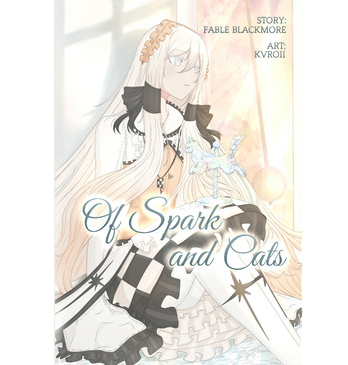

Spark Iskra left the human world 13 years ago. Now returning to prevent the formation of strange worlds that give a shape to their hosts’ most painful feelings, she becomes entangled in the lives of those who are connected to them. What could a glass cat and a painting do to cause someone to disappear? And given the chance, could Spark resist the true nature of her own world if it meant keeping everyone safe, or would she return to the very thing she was trying to keep them safe from?
This magical girl GL shoujo manga is my debut manga, which was published on April 30th, 2023. Available on Amazon in paperback and Kindle eBook formats.
Also available to read for free on Pixiv!
Novels: Myrios Series (Poisoner's City, Poisoned Memories, Poison World)
The Myrios Series is a series of three books following protagonist Kori Omoide as she discovers the secrets of the company that runs the technologically advanced city of Myrios.
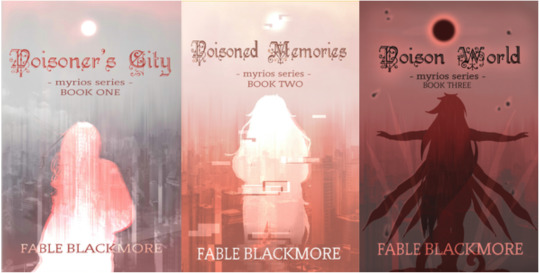
Poisoner's City
Kori Omoide owns a coffee shop in Myrios, a technologically advanced city created by a group named Ares. However, when a mysterious toxin spreads through this new city, killing thousands of people, the blame falls on a mysterious masked boy by the name of Phantom. Phantom knows things about Kori's past that even she can't recall, and she knows that Phantom isn't guilty. Kori goes undercover to work for Ares to clear Phantom's name, where she meets a boy created in one of their experiments. Torn between her desire to protect him, but desperate to find out all he knows about Ares and the toxin, she gets caught between her new job and the realization that the experiment boy could be the secret to curing the toxin, but also the very reason that Ares wished to keep it a secret for so long. Can Kori clear Phantom's name, and in doing so, will she be able to avoid getting poisoned? Or will she put her life in Myrios at risk just to uncover the truth about the toxin and the experiment boy?
Poisoned Memories
Shortly after Kori Omoide uncovers the secret of the toxin that plagued the advanced city of Myrios, tensions arise between herself and the new leader of Phantom’s former followers. Kori wishes to protect the experiment cyborg at the heart of the trouble, while the new leader seeks to condemn him for his role in the harm that came from his creation. When Kori confronts the unusually familiar leader, she’s left with false memories, and she must find a way to remove them before she loses herself to them. However, with the leader being a goddess from the strange homeland she knows little about, and that homeland bringing unusual changes to her body, can she fix her memories before it brings danger to herself or the experiment cyborg, or will she lose everything trying?
Poison World
When the disappearance of Phecda Shioto brings an unexpected visitor to Kori Omoide’s doorstep, she finally learns the truth behind the mysterious homeland that stripped her of her memories years before. Determined to travel to this land and bring him back, but knowing her banishment would bring complications if she was discovered, she plans to go to the land of Curiah as Marun Ookami, the persona she created when she first went undercover at Ares a year before. However, the discovery of a third cyborg brings revelations about a final project that could bring the threat of Ares closer than ever to the Floor Nine team that Marun worked for, and could destroy his chance to save Phecda. With only limited time before the next coronation that will take Phecda from her forever, can Kori contend with dangers in both a faraway land and far too close to home?
MYRIOS -Complete Illustrated Series-
A collection of all three Myrios Series novels with 75 original light novel style illustrations. Available in hardcover and ebook formats.

#kvroii#pinned post#introduction#of spark and cats#myrios series#mangaka#author#artists on tumblr#poisoners city#poisoned memories#poison world#myrios -complete illustrated series-#myrios illustration project
11 notes
·
View notes
Text
Chapter One of “Picks and Shovels” (Part 1)
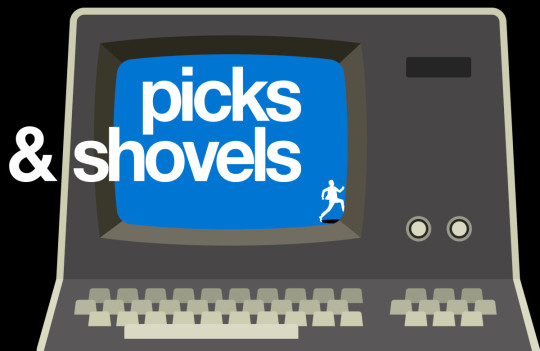
Picks and Shovels is a new, standalone technothriller starring Marty Hench, my two-fisted, hard-fighting, tech-scam-busting forensic accountant. You can pre-order it on my latest Kickstarter, which features a brilliant audiobook read by Wil Wheaton.

My next novel is Picks and Shovels, out next month. It's tells the origin story of Martin Hench, my hard-charging, scambusting, high-tech forensic accountant, in a 1980s battle over the soul of a PC company:
https://us.macmillan.com/books/9781250865908/picksandshovels
I'm currently running a Kickstarter to pre-sell the book in every format: hardcover, DRM-free ebook, and an independently produced, fabulous DRM-free audiobook read by Wil Wheaton, who just nailed the delivery:
https://www.kickstarter.com/projects/doctorow/picks-and-shovels-marty-hench-at-the-dawn-of-enshittification
Picks and Shovels opens with a long prologue that recounts Marty's misadventures as a failing computer science student at MIT, his love-affair with computers, and his first disastrous startup venture. It ends with him decamping to Silicon Valley with his roommate Art, a brilliant programmer, to seek their fortune.
Chapter one opens with Marty's first job, working for a weird PC company (there were so many weird PC companies back then!). I've posted Wil's audio reading of chapter one as a teaser for the Kickstarter:
https://www.youtube.com/watch?v=IGXz1mkAd2Q
(Here it is as an MP3 at the Internet Archive:)
https://ia600607.us.archive.org/5/items/picks-and-shovels-promo/audio.mp3
The audio is great, but I thought I'd also serialize the text of Chapter One here, in five or six chunks. If you enjoy this and want to pre-order the book, please consider backing the Kickstarter:
https://www.kickstarter.com/projects/doctorow/picks-and-shovels-marty-hench-at-the-dawn-of-enshittification
Chapter One
Fidelity Computing was the most colorful PC company in Silicon Valley.
A Catholic priest, a Mormon bishop, and an Orthodox rabbi walk into a technology gold rush and start a computer company. The fact that it sounded like the setup for a nerdy joke about the mid-1980s was fantastic for their bottom line. Everyone who heard their story loved it.
As juicy as the story of Fidelity Computing was, they flew under most people’s radar for years, even as they built a wildly profitable technology empire through direct sales through faith groups. The first time most of us heard of them was in 1983, when Byte ran its cover story on Fidelity Computing, unearthing a parallel universe of technology that had grown up while no one was looking.
At first, I thought maybe they were doing something similar to Apple’s new Macintosh: like Apple, they made PCs (the Wise PC), an operating system (Wise DOS), and a whole line of monitors, disk drives, printers, and software.
Like the Mac, none of these things worked with anything else—you needed to buy everything from floppy disks to printer cables specially from them, because nothing anyone else made would work with their system.
And like the Mac, they sold mostly through word of mouth. The big difference was that Mac users were proud to call themselves a cult, while Fidelity Computing’s customers were literally a religion.
Long after Fidelity had been called to the Great Beyond, its most loyal customers gave it an afterlife, nursing their computers along, until the parts and supplies ran out. They’d have kept going even then, if there’d been any way to unlock their machines and use the same stuff the rest of the computing world relied on. But that wasn’t something Fidelity Computing would permit, even from beyond the grave.
I was summoned to Fidelity headquarters—in unfashionable Colma, far from the white-hot start-ups of Palo Alto, Mountain View, and, of course, Cupertino—by a friend of Art’s. Art had a lot more friends than me. I was a skipping stone, working as the part-time bookkeeper/accountant/CFO for half a dozen companies and never spending more than one or two days in the same office.
Art was hardly more stable than me—he switched start-ups all the time, working for as little as two months (and never for more than a year) before moving on. His bosses knew what they were getting: you hired Art Hellman to blaze into your company, take stock of your product plan, root out and correct all of its weak points, build core code libraries, and then move on. He was good enough and sufficiently in demand to command the right to behave this way, and he wouldn’t have it any other way. My view was, it was an extended celebration of his liberation from the legal villainy of Nick Cassidy III: having narrowly escaped a cage, he was determined never to be locked up again.
Art’s “engagements”—as he called them—earned him the respect and camaraderie of half the programmers and hardware engineers in the Valley. This, in spite of the fact that he was a public and ardent member of the Lavender Panthers, wore the badge on his lapel, went to the marches, and brought his boyfriend to all the places where his straight colleagues brought their girlfriends.
He’d come out to me less than a week after I arrived by the simple expedient of introducing the guy he was watching TV with in our living room as Lewis, his boyfriend. Lewis was a Chinese guy about our age, and his wardrobe—plain white tee, tight blue jeans, loafers—matched the new look Art had adopted since leaving Boston. Lewis had a neat, short haircut that matched Art’s new haircut, too.
To call the Art I’d known in Cambridge a slob would be an insult to the natty, fashion-conscious modern slob. He’d favored old band T-shirts with fraying armpit seams, too-big jeans that were either always sliding off his skinny hips or pulled up halfway to his nipples. In the summer, his sneakers had holes in the toes. In the winter, his boots were road-salt-crusted crystalline eruptions. His red curls were too chaotic for a white-boy ’fro and were more of a heap, and he often went days without shaving.
There were members of the Newbury Street Irregulars who were bigger slobs than Art, but they smelled. Art washed, but otherwise, he looked like a homeless person (or a hacker). His transformation to a neatly dressed, clean-shaven fellow with a twenty-five-dollar haircut that he actually used some sort of hairspray on was remarkable. I’d assumed it was about his new life as a grown-up living far from home and doing a real job. It turned out that wasn’t the reason at all.
“Oh,” I said. “That makes a lot of sense.” I shook Lewis’s hand. He laughed. I checked Art. He was playing it cool, but I could tell he was nervous. I remembered Lucille and how she listened, and what it felt like to be heard. I thought about Art, and the things he’d never been able to tell me.
There’d been a woman in the Irregulars who there were rumors about, and there were a pair of guys one floor down in Art’s building who held hands in the elevator, but as far as I knew up until that moment, I hadn’t really ever been introduced to a homosexual person. I didn’t know how I felt about it, but I did know how I wanted to feel about it.
So Art didn’t just get to know all kinds of geeks from his whistle-stop tour of Silicon Valley’s hottest new tech ventures. He was also plugged into this other network of people from the Lavender Panthers, and their boyfriends and girlfriends, and the people he knew from bars and clubs. He and Lewis lasted for a couple of months, and then there were a string of weekends where there was a new guy at the breakfast table, and then he settled down again for a while with Artemis, and then he hit a long dry spell.
I commiserated. I’d been having a dry spell for nearly the whole two years I’d been in California. The closest I came to romance was exchanging a letter with Lucille every couple of weeks—she was a fine pen pal, but that wasn’t really a substitute for a living, breathing woman in my life.
Art threw himself into his volunteer work, and he was only half joking when he said he did it to meet a better class of boys than you got at a club. Sometimes, there’d be a committee meeting in our living room and I’d hear about the congressional committee hearing on the “gay plague” and the new wave of especially vicious attacks. It was pretty much the only time I heard about that stuff—no one I worked with ever brought it up, unless it was to make a terrible joke.
It was Murf, one of the guys from those meetings, who told me that Fidelity Computing was looking for an accountant for a special project. He had stayed after the meeting and he and Art made a pot of coffee and sat down in front of Art’s Apple clone, a Franklin Ace 1200 that he’d scored six months ahead of its official release. After opening the lid to show Murf the interior, Art fired it up and put it through its paces.
I hovered over his shoulder, watching. I’d had a couple of chances to play with the 1200, and I wanted one more than anything in the world except for a girlfriend.
“Marty,” Art said, “Murf was telling me about a job I thought you might be good for.”
The Ace 1200 would have a list price of $2,200. I pulled up a chair.
Fidelity Computing’s business offices were attached to their warehouse, right next to their factory. It took up half of a business park in Colma, and I had to circle it twice to find a parking spot. I was five minutes late and flustered when I presented myself to the receptionist, a blond woman with a ten – years – out – of – date haircut and a modest cardigan over a sensible white shirt buttoned to the collar, ring on her finger.
“Hello,” I said. “I’m Marty Hench. I—uh—I’ve got a meeting with the Reverend Sirs.” That was what the executive assistant I’d spoken to on the phone had called them. It sounded weird when he said it. It sounded weirder when I said it.
The receptionist gave me a smile that only went as far as her lips. “Please have a seat,” she said. There were only three chairs in the little reception area, vinyl office chairs with worn wooden armrests. There weren’t any magazines, just glossy catalogs featuring the latest Fidelity Computing systems, accessories, consumables, and software. I browsed one, marveling at the parallel universe of computers in the strange, mauve color that denoted all Fidelity equipment, including the boxes, packaging, and, now that I was attuned to it, the accents and carpet in the small lobby. A side door opened and a young, efficient man in a kippah and wire-rim glasses called for me: “Mr. Hench?” I closed the catalog and returned it to the pile and stood. As I went to shake his hand, I realized that something had been nagging me about the catalog—there were no prices.
“I’m Shlomo,” the man said. “We spoke on the phone. Thank you for coming down. The Reverend Sirs are ready to see you now.”
He wore plain black slacks, hard black shiny shoes, and a white shirt with prayer-shawl tassels poking out of its tails. I followed him through a vast room filled with chest-high Steelcase cubicles finished in yellowing, chipped wood veneer, every scratch pitilessly lit by harsh overhead fluorescents. Most of the workers at the cubicles were women with headsets, speaking in hushed tones. The tops of their heads marked the interfaith delineators: a block of Orthodox headscarves, then a block of nuns’ black and white scarves (I learned to call them “veils” later), then the Mormons’ carefully coiffed, mostly blond dos.
“This way,” Shlomo said, passing through another door and into executive row. The mauve carpets were newer, the nap all swept in one direction. The walls were lined with framed certificates of appreciation, letters from religious and public officials (apparently, the church and state were not separate within the walls of Fidelity Computing), photos of groups of progressively larger groups of people ranked before progressively larger offices—the company history.
We walked all the way to the end of the hall, past closed doors with nameplates, to a corner conference room with a glass wall down one side, showing a partial view of a truck-loading dock behind half-closed vertical blinds. Seated at intervals around a large conference table were the Reverend Sirs themselves, each with his own yellow pad, pencil, and coffee cup.
Shlomo announced me: “Reverend Sirs, this is Marty Hench. Mr. Hench, these are Rabbi Yisrael Finkel, Bishop Leonard Clarke, and Father Marek Tarnowski.” He backed out of the door, leaving me standing, unsure if I should circle the table shaking hands, or take a seat, or—
“Please, sit,” Rabbi Finkel said. He was fiftyish, round-faced and bear-shaped with graying sidelocks and beard and a black suit and tie. His eyes were sharp behind horn-rimmed glasses. He gestured to a chair at the foot of the table.
I sat, then rose a little to undo the button of my sport coat. I hadn’t worn it since my second job interview, when I realized it was making the interviewers uncomfortable. It certainly made me uncomfortable. I fished out the little steno pad and stick pen I’d brought with me.
“Thank you for coming, Mr. Hench.” The rabbi had an orator’s voice, that big chest of his serving as a resonating chamber like a double bass.
“Of course,” I said. “Thanks for inviting me. It’s a fascinating company you have here.”
Bishop Clarke smiled at that. He was the best dressed of the three, in a well-cut business suit, his hair short, neat, side-parted. His smile was very white, and very wide. He was the youngest of the three—in his late thirties, I’d guess. “Thank you,” he said. “We know we’re very different from the other computer companies, and we like it that way. We like to think that we see something in computers—a potential—that other people have missed.”
Father Tarnowski scowled. He was cadaverously tall and thin, with the usual dog collar and jacket, and a heavy gold class ring. His half-rim glasses flashed. He was the oldest, maybe sixty, and had a sour look that I took for habitual. “He doesn’t want the press packet, Leonard,” he said. “Let’s get to the point.” He had a broad Chicago accent like a tough-guy gangster in The Untouchables.
Bishop Clarke’s smile blinked off and on for an instant and I was overcome with the sudden knowledge that these two men did not like each other at all, and that there was some kind of long-running argument simmering beneath the surface. “Thank you, Marek, of course. Mr. Hench’s time is valuable.” Father Tarnowski snorted softly at that and the bishop pretended he didn’t hear it, but I saw Rabbi Finkel grimace at his yellow pad.
“What can I help you Reverend Sirs with today?” Reverend Sirs came more easily now, didn’t feel ridiculous at all. The three of them gave the impression of being a quarter inch away from going for each other’s throats, and the formality was a way to keep tensions at a distance.
“We need a certain kind of accountant,” the rabbi said. He’d dated the top of his yellow pad and then circled the date. “A kind of accountant who understands the computer business. Who understands computers, on a technical level. It’s hard to find an accountant like that, believe it or not, even in Silicon Valley.” I didn’t point out that Colma wasn’t in Silicon Valley.
“Well,” I said, carefully. “I think I fit that bill. I’ve only got an associate’s degree in accounting, but I’m a kind of floating CFO for half a dozen companies and I’ve been doing night classes at UCSF Extension to get my bachelor’s. I did a year at MIT and built my own computer a few years back. I program pretty well in BASIC and Pascal and I’ve got a little C, and I’m a pretty darned good debugger, if I do say so myself.”
Bishop Clarke gave a small but audible sigh of relief. “You do indeed sound perfect, and I’m told that Shlomo spoke to your references and they were very enthusiastic about your diligence and . . . discretion.”
I’d given Shlomo a list of four clients I’d done extensive work with, but I hadn’t had “discretion” in mind when I selected them. It’s true that doing a company’s accounts made me privy to some sensitive information—like when two employees with the same job were getting paid very different salaries—but I got the feeling that wasn’t the kind of “discretion” the bishop had in mind.
“I’m pretty good at minding my own business,” I said, and then, “even when I’m being paid to mind someone else’s.” I liked that line, and made a mental note about it. Maybe someday I’d put it on my letterhead. Martin Hench: Confidential CPA.
The bishop favored me with a chuckle. The rabbi nodded thoughtfully. The priest scowled.
“That’s very good,” the bishop said. “What we’d like to discuss today is of a very sensitive nature, and I’m sure you’ll understand if we would like more than your good word to rely on.” He lifted his yellow pad, revealing a single page, grainily photocopied, and slid it over the table to me. “That’s our standard nondisclosure agreement,” he said. He slid a pen along to go with it.
I didn’t say anything. I’d signed a few NDAs, but only after I’d taken a contract. This was something different. I squinted at the page, which was a second- or third-generation copy and blurry in places. I started to read it. The bishop made a disgusted noise. I pretended I didn’t hear him.
I crossed out a few clauses and carefully lettered in an amendment. I initialed the changes and slid the paper back across the table to the bishop, and found the smile was gone from his face. All three of them were now giving me stern looks, wrath-of-God looks, the kind of looks that would make a twenty-one-year-old kid like me very nervous indeed. I felt the nerves rise and firmly pushed them down.
“Mr. Hench,” the bishop said, his tone low and serious, “is there some kind of problem?”
It pissed me off. I’d driven all the way to for-chrissakes Colma and these three weirdo God-botherers had ambushed me with their everything – and – the – kitchen – sink contract. I had plenty of work, and I didn’t need theirs, especially not if this was the way they wanted to deal. This had suddenly become a negotiation, and my old man had always told me the best negotiating position was a willingness to get up from the table. I was going to win this negotiation, one way or another.
“No problem,” I said.
“And yet you appear to have made alterations to our standard agreement.”
“I did,” I said. That’s not a problem for me, I didn’t say.
He gave me more of that stern eyeball-ray stuff. I let my negotiating leverage repel it. “Mr. Hench, our standard agreement can only be altered after review by our general counsel.”
“That sounds like a prudent policy,” I said, and met his stare.
He clucked his tongue. “I can get a fresh one,” he said. “This one is no good.”
I cocked my head. “I think it’d be better to get your general counsel, wouldn’t it?”
The three of them glared at me. I found I was enjoying myself. What’s more, I thought Rabbi Finkel might be suppressing a little smile, though the beard made it hard to tell.
“Let me see it,” he said, holding his hand out.
Bishop Clarke gave a minute shake of his head. The rabbi half rose, reached across the table, and slid it over to himself, holding it at arm’s length and adjusting his glasses. He picked up his pen and initialed next to my changes.
“Those should be fine,” he said, and slid it back to me. “Sign, please.”
“Yisrael,” Bishop Clarke said, an edge in his voice, “changes to the standard agreements need to be reviewed—”
“By our general counsel,” the rabbi finished, waving a dismissive gesture at him. “I know, I know. But these are fine. We should probably make the same changes to all our agreements. Meanwhile, we’ve all now had a demonstration that Mr. Hench is the kind of person who takes his promises seriously. Would you rather have someone who doesn’t read and signs his life away, or someone who makes sure he knows what he’s signing and agrees with it?”
Bishop Clarke’s smile came back, strained at the corners. “That’s an excellent point, Rabbi. Thank you for helping me understand your reasoning.” He collected the now-signed contract from me and tucked it back under his yellow pad.
“Now,” he said, “we can get down to the reason we asked you here today.”
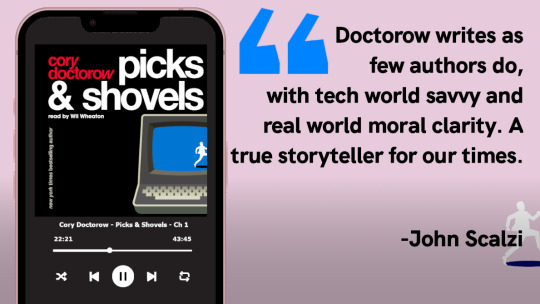
Check out my Kickstarter to pre-order copies of my next novel, Picks and Shovels!

If you'd like an essay-formatted version of this post to read or share, here's a link to it on pluralistic.net, my surveillance-free, ad-free, tracker-free blog:
https://pluralistic.net/2025/01/09/the-reverend-sirs/#fidelity-computing/
#pluralistic#martin hench#marty hench#weird pcs#picks and shovels#science fiction#technothrillers#the eighties#the 80s#eighties#80s#thrillers#crime#scams#pyramid schemes#multilevel marketing#mlms#scambusting#forensic accounting#fiction
23 notes
·
View notes